Evaluation of Electronic Health Records in Irish Healthcare System
VerifiedAdded on 2022/09/09
|9
|2151
|20
Report
AI Summary
This report offers a critical evaluation of Electronic Health Records (EHR) within the Irish healthcare system. It begins by defining health informatics and the role of EHR in improving patient care, emphasizing its significance, especially in streamlining workflows, enhancing patient safety, and improving diagnostic outcomes. The report explores the benefits of EHR, such as improved patient safety and data storage, while also addressing challenges like data entry errors and security concerns. It details the necessary infrastructure for EHR implementation, including hardware, software, and standardized reporting, while also discussing mechanisms for confidentiality and data protection, referencing guidelines from the Health Information and Quality Authority (HIQA). The report further examines the impact of policies on EHR processes and quality standards, stressing the importance of stakeholder collaboration. The report concludes by summarizing the benefits and challenges associated with EHR use, highlighting the need for stakeholder collaboration and attention to privacy and technical issues to align the technology with the healthcare system effectively. The report uses multiple sources to support the arguments and provide a comprehensive overview of EHR within the Irish context.
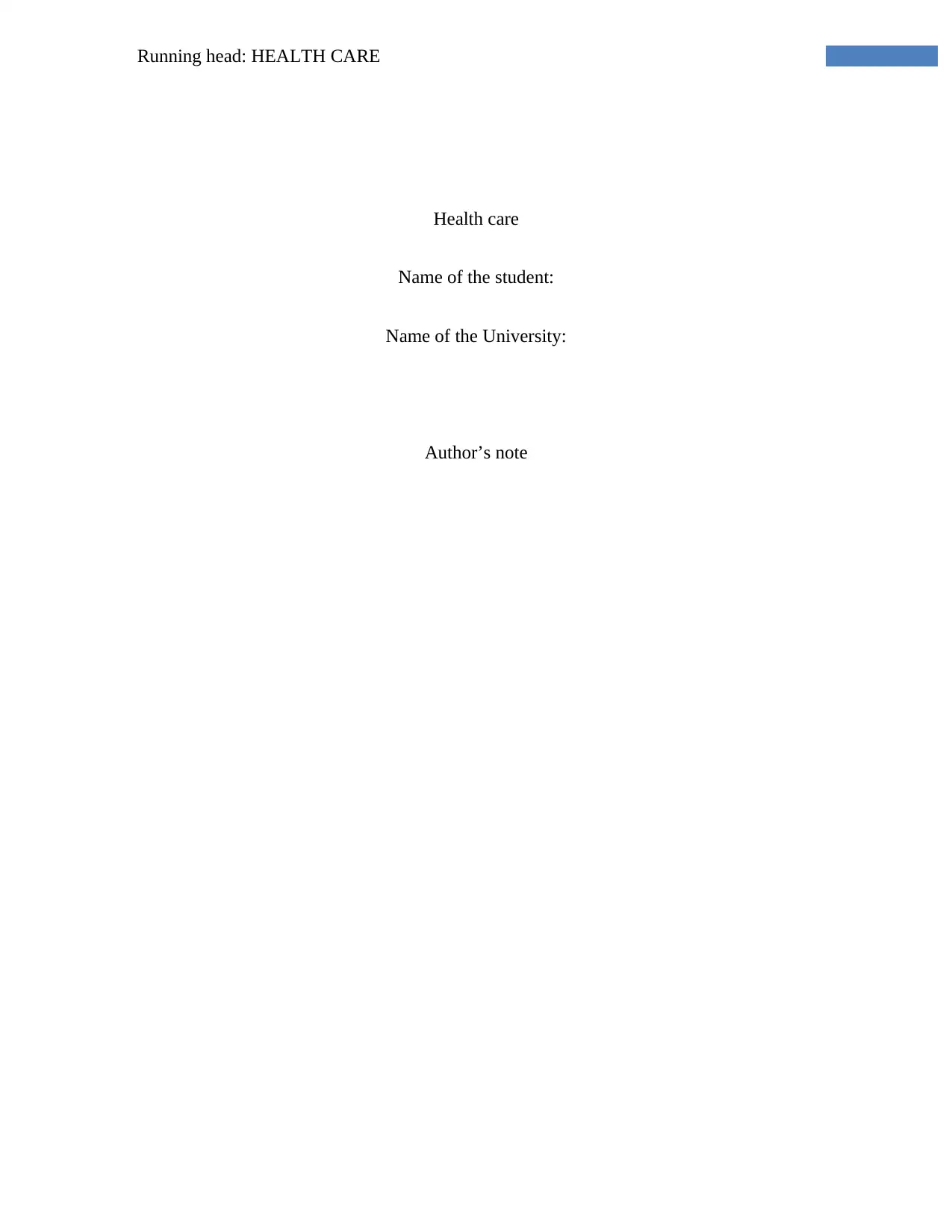
Running head: HEALTH CARE
Health care
Name of the student:
Name of the University:
Author’s note
Health care
Name of the student:
Name of the University:
Author’s note
Paraphrase This Document
Need a fresh take? Get an instant paraphrase of this document with our AI Paraphraser
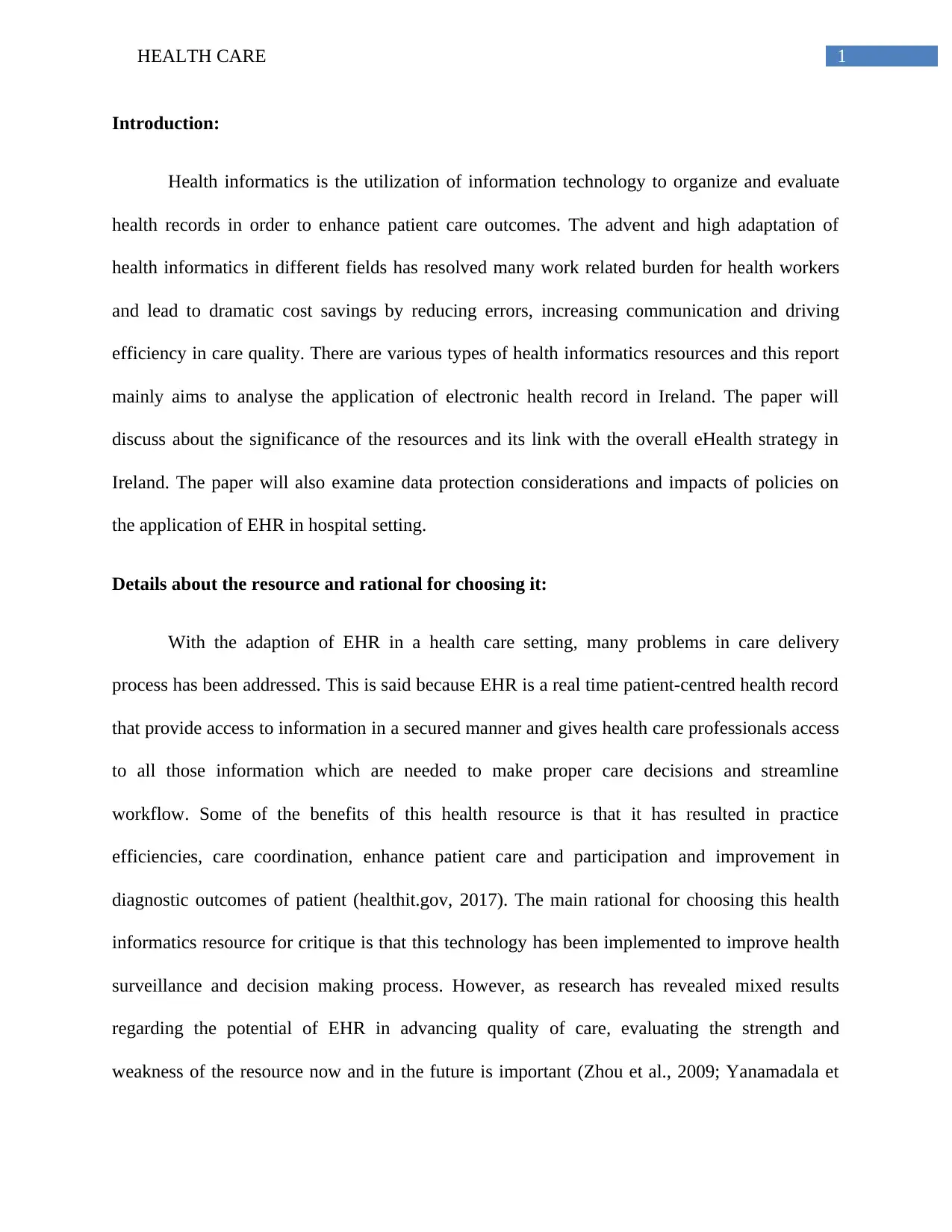
1HEALTH CARE
Introduction:
Health informatics is the utilization of information technology to organize and evaluate
health records in order to enhance patient care outcomes. The advent and high adaptation of
health informatics in different fields has resolved many work related burden for health workers
and lead to dramatic cost savings by reducing errors, increasing communication and driving
efficiency in care quality. There are various types of health informatics resources and this report
mainly aims to analyse the application of electronic health record in Ireland. The paper will
discuss about the significance of the resources and its link with the overall eHealth strategy in
Ireland. The paper will also examine data protection considerations and impacts of policies on
the application of EHR in hospital setting.
Details about the resource and rational for choosing it:
With the adaption of EHR in a health care setting, many problems in care delivery
process has been addressed. This is said because EHR is a real time patient-centred health record
that provide access to information in a secured manner and gives health care professionals access
to all those information which are needed to make proper care decisions and streamline
workflow. Some of the benefits of this health resource is that it has resulted in practice
efficiencies, care coordination, enhance patient care and participation and improvement in
diagnostic outcomes of patient (healthit.gov, 2017). The main rational for choosing this health
informatics resource for critique is that this technology has been implemented to improve health
surveillance and decision making process. However, as research has revealed mixed results
regarding the potential of EHR in advancing quality of care, evaluating the strength and
weakness of the resource now and in the future is important (Zhou et al., 2009; Yanamadala et
Introduction:
Health informatics is the utilization of information technology to organize and evaluate
health records in order to enhance patient care outcomes. The advent and high adaptation of
health informatics in different fields has resolved many work related burden for health workers
and lead to dramatic cost savings by reducing errors, increasing communication and driving
efficiency in care quality. There are various types of health informatics resources and this report
mainly aims to analyse the application of electronic health record in Ireland. The paper will
discuss about the significance of the resources and its link with the overall eHealth strategy in
Ireland. The paper will also examine data protection considerations and impacts of policies on
the application of EHR in hospital setting.
Details about the resource and rational for choosing it:
With the adaption of EHR in a health care setting, many problems in care delivery
process has been addressed. This is said because EHR is a real time patient-centred health record
that provide access to information in a secured manner and gives health care professionals access
to all those information which are needed to make proper care decisions and streamline
workflow. Some of the benefits of this health resource is that it has resulted in practice
efficiencies, care coordination, enhance patient care and participation and improvement in
diagnostic outcomes of patient (healthit.gov, 2017). The main rational for choosing this health
informatics resource for critique is that this technology has been implemented to improve health
surveillance and decision making process. However, as research has revealed mixed results
regarding the potential of EHR in advancing quality of care, evaluating the strength and
weakness of the resource now and in the future is important (Zhou et al., 2009; Yanamadala et
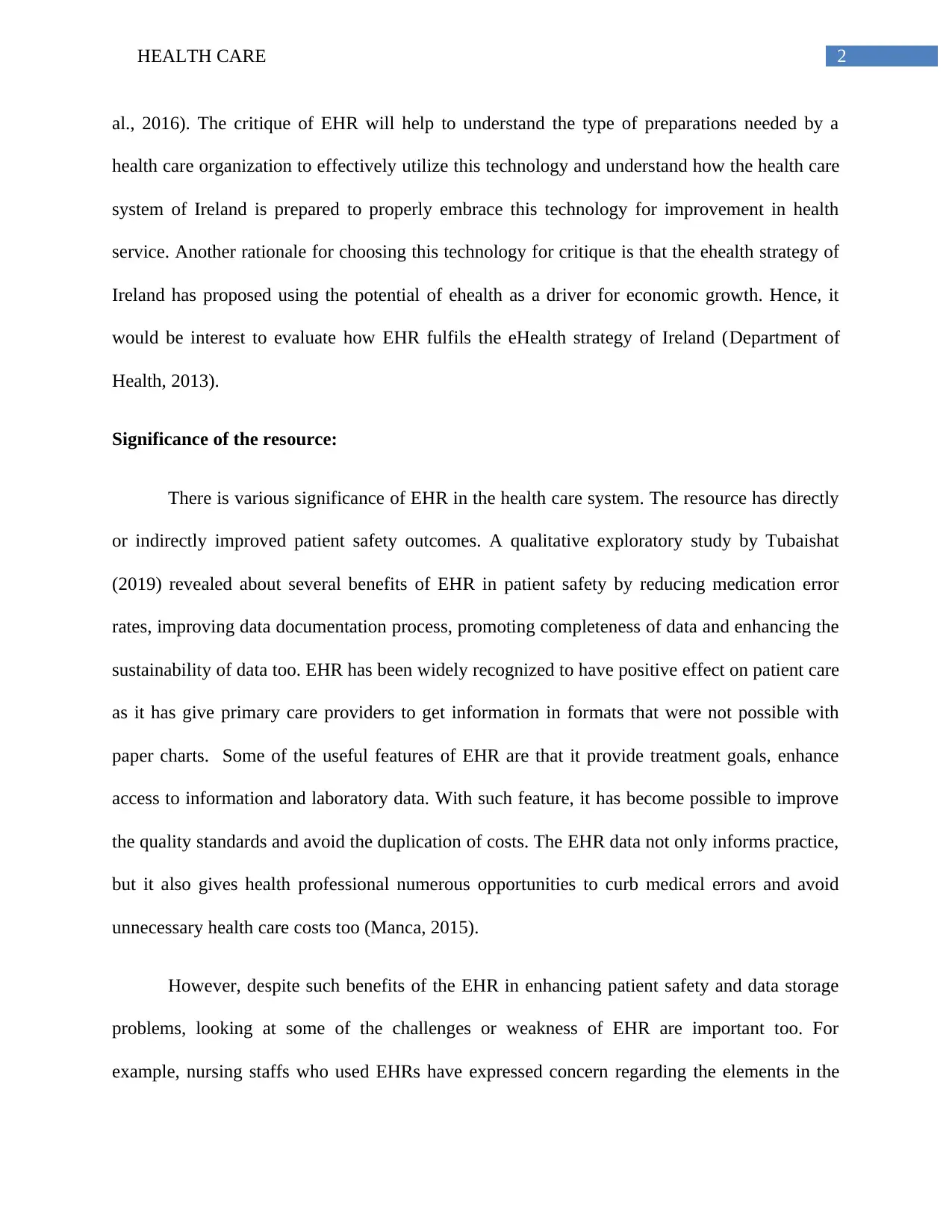
2HEALTH CARE
al., 2016). The critique of EHR will help to understand the type of preparations needed by a
health care organization to effectively utilize this technology and understand how the health care
system of Ireland is prepared to properly embrace this technology for improvement in health
service. Another rationale for choosing this technology for critique is that the ehealth strategy of
Ireland has proposed using the potential of ehealth as a driver for economic growth. Hence, it
would be interest to evaluate how EHR fulfils the eHealth strategy of Ireland (Department of
Health, 2013).
Significance of the resource:
There is various significance of EHR in the health care system. The resource has directly
or indirectly improved patient safety outcomes. A qualitative exploratory study by Tubaishat
(2019) revealed about several benefits of EHR in patient safety by reducing medication error
rates, improving data documentation process, promoting completeness of data and enhancing the
sustainability of data too. EHR has been widely recognized to have positive effect on patient care
as it has give primary care providers to get information in formats that were not possible with
paper charts. Some of the useful features of EHR are that it provide treatment goals, enhance
access to information and laboratory data. With such feature, it has become possible to improve
the quality standards and avoid the duplication of costs. The EHR data not only informs practice,
but it also gives health professional numerous opportunities to curb medical errors and avoid
unnecessary health care costs too (Manca, 2015).
However, despite such benefits of the EHR in enhancing patient safety and data storage
problems, looking at some of the challenges or weakness of EHR are important too. For
example, nursing staffs who used EHRs have expressed concern regarding the elements in the
al., 2016). The critique of EHR will help to understand the type of preparations needed by a
health care organization to effectively utilize this technology and understand how the health care
system of Ireland is prepared to properly embrace this technology for improvement in health
service. Another rationale for choosing this technology for critique is that the ehealth strategy of
Ireland has proposed using the potential of ehealth as a driver for economic growth. Hence, it
would be interest to evaluate how EHR fulfils the eHealth strategy of Ireland (Department of
Health, 2013).
Significance of the resource:
There is various significance of EHR in the health care system. The resource has directly
or indirectly improved patient safety outcomes. A qualitative exploratory study by Tubaishat
(2019) revealed about several benefits of EHR in patient safety by reducing medication error
rates, improving data documentation process, promoting completeness of data and enhancing the
sustainability of data too. EHR has been widely recognized to have positive effect on patient care
as it has give primary care providers to get information in formats that were not possible with
paper charts. Some of the useful features of EHR are that it provide treatment goals, enhance
access to information and laboratory data. With such feature, it has become possible to improve
the quality standards and avoid the duplication of costs. The EHR data not only informs practice,
but it also gives health professional numerous opportunities to curb medical errors and avoid
unnecessary health care costs too (Manca, 2015).
However, despite such benefits of the EHR in enhancing patient safety and data storage
problems, looking at some of the challenges or weakness of EHR are important too. For
example, nursing staffs who used EHRs have expressed concern regarding the elements in the
⊘ This is a preview!⊘
Do you want full access?
Subscribe today to unlock all pages.

Trusted by 1+ million students worldwide
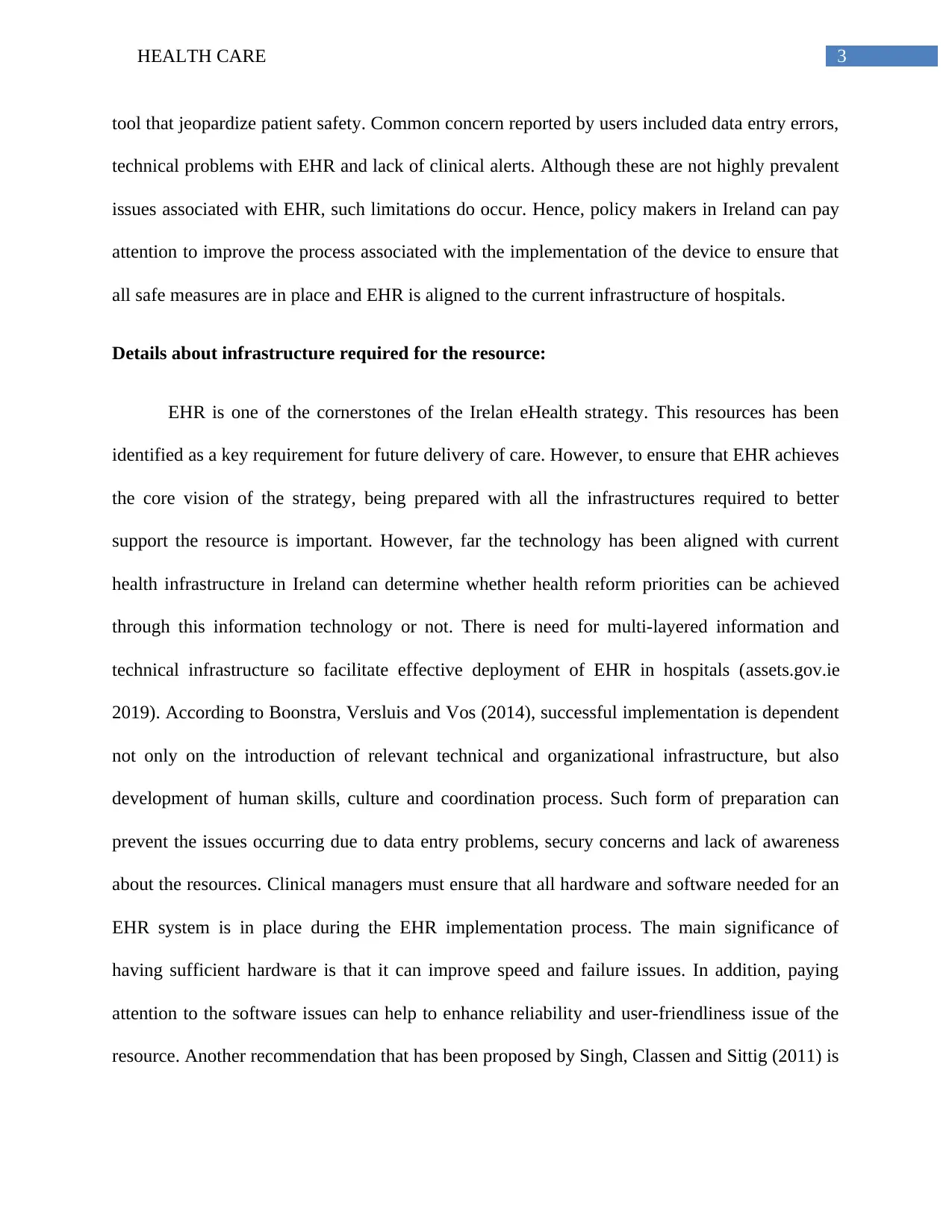
3HEALTH CARE
tool that jeopardize patient safety. Common concern reported by users included data entry errors,
technical problems with EHR and lack of clinical alerts. Although these are not highly prevalent
issues associated with EHR, such limitations do occur. Hence, policy makers in Ireland can pay
attention to improve the process associated with the implementation of the device to ensure that
all safe measures are in place and EHR is aligned to the current infrastructure of hospitals.
Details about infrastructure required for the resource:
EHR is one of the cornerstones of the Irelan eHealth strategy. This resources has been
identified as a key requirement for future delivery of care. However, to ensure that EHR achieves
the core vision of the strategy, being prepared with all the infrastructures required to better
support the resource is important. However, far the technology has been aligned with current
health infrastructure in Ireland can determine whether health reform priorities can be achieved
through this information technology or not. There is need for multi-layered information and
technical infrastructure so facilitate effective deployment of EHR in hospitals (assets.gov.ie
2019). According to Boonstra, Versluis and Vos (2014), successful implementation is dependent
not only on the introduction of relevant technical and organizational infrastructure, but also
development of human skills, culture and coordination process. Such form of preparation can
prevent the issues occurring due to data entry problems, secury concerns and lack of awareness
about the resources. Clinical managers must ensure that all hardware and software needed for an
EHR system is in place during the EHR implementation process. The main significance of
having sufficient hardware is that it can improve speed and failure issues. In addition, paying
attention to the software issues can help to enhance reliability and user-friendliness issue of the
resource. Another recommendation that has been proposed by Singh, Classen and Sittig (2011) is
tool that jeopardize patient safety. Common concern reported by users included data entry errors,
technical problems with EHR and lack of clinical alerts. Although these are not highly prevalent
issues associated with EHR, such limitations do occur. Hence, policy makers in Ireland can pay
attention to improve the process associated with the implementation of the device to ensure that
all safe measures are in place and EHR is aligned to the current infrastructure of hospitals.
Details about infrastructure required for the resource:
EHR is one of the cornerstones of the Irelan eHealth strategy. This resources has been
identified as a key requirement for future delivery of care. However, to ensure that EHR achieves
the core vision of the strategy, being prepared with all the infrastructures required to better
support the resource is important. However, far the technology has been aligned with current
health infrastructure in Ireland can determine whether health reform priorities can be achieved
through this information technology or not. There is need for multi-layered information and
technical infrastructure so facilitate effective deployment of EHR in hospitals (assets.gov.ie
2019). According to Boonstra, Versluis and Vos (2014), successful implementation is dependent
not only on the introduction of relevant technical and organizational infrastructure, but also
development of human skills, culture and coordination process. Such form of preparation can
prevent the issues occurring due to data entry problems, secury concerns and lack of awareness
about the resources. Clinical managers must ensure that all hardware and software needed for an
EHR system is in place during the EHR implementation process. The main significance of
having sufficient hardware is that it can improve speed and failure issues. In addition, paying
attention to the software issues can help to enhance reliability and user-friendliness issue of the
resource. Another recommendation that has been proposed by Singh, Classen and Sittig (2011) is
Paraphrase This Document
Need a fresh take? Get an instant paraphrase of this document with our AI Paraphraser
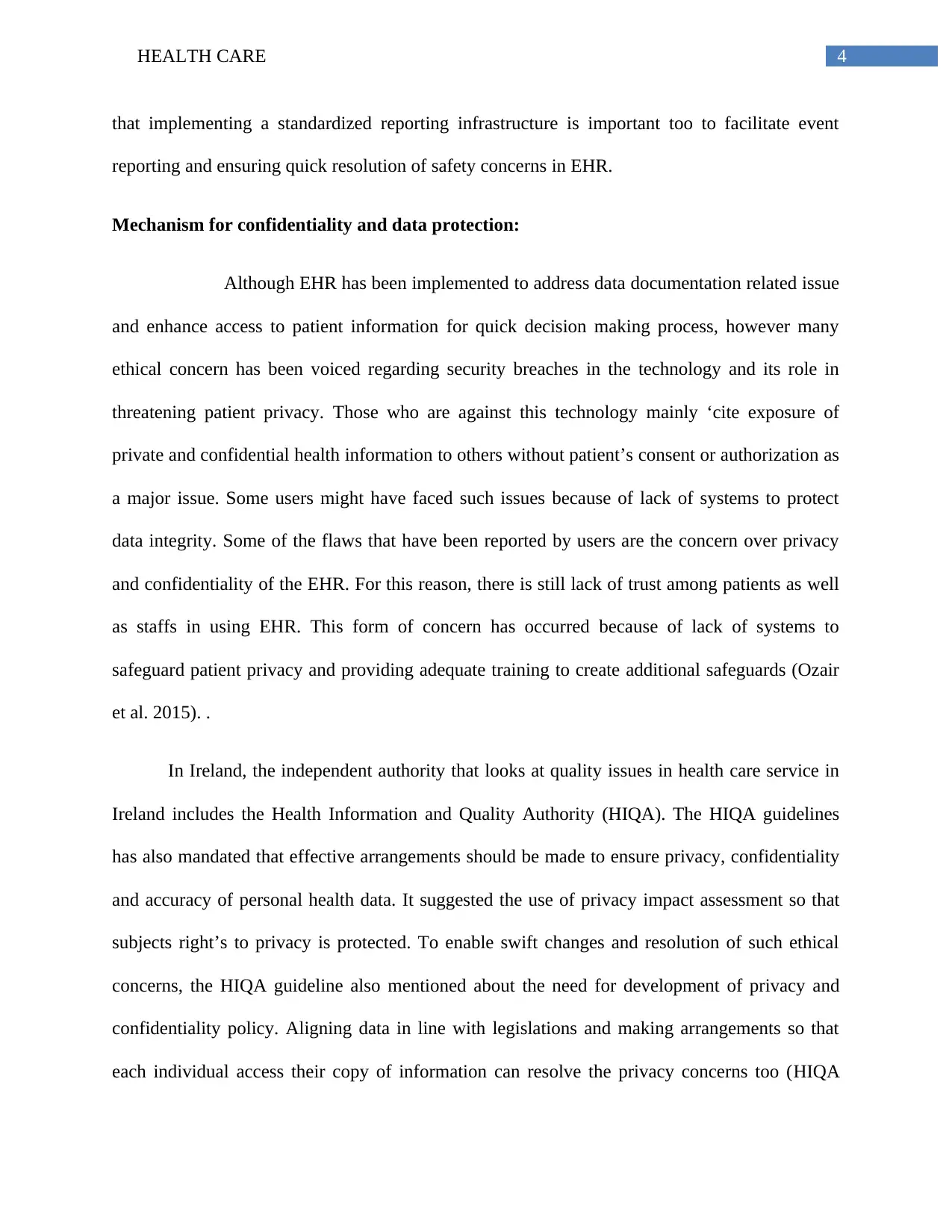
4HEALTH CARE
that implementing a standardized reporting infrastructure is important too to facilitate event
reporting and ensuring quick resolution of safety concerns in EHR.
Mechanism for confidentiality and data protection:
Although EHR has been implemented to address data documentation related issue
and enhance access to patient information for quick decision making process, however many
ethical concern has been voiced regarding security breaches in the technology and its role in
threatening patient privacy. Those who are against this technology mainly ‘cite exposure of
private and confidential health information to others without patient’s consent or authorization as
a major issue. Some users might have faced such issues because of lack of systems to protect
data integrity. Some of the flaws that have been reported by users are the concern over privacy
and confidentiality of the EHR. For this reason, there is still lack of trust among patients as well
as staffs in using EHR. This form of concern has occurred because of lack of systems to
safeguard patient privacy and providing adequate training to create additional safeguards (Ozair
et al. 2015). .
In Ireland, the independent authority that looks at quality issues in health care service in
Ireland includes the Health Information and Quality Authority (HIQA). The HIQA guidelines
has also mandated that effective arrangements should be made to ensure privacy, confidentiality
and accuracy of personal health data. It suggested the use of privacy impact assessment so that
subjects right’s to privacy is protected. To enable swift changes and resolution of such ethical
concerns, the HIQA guideline also mentioned about the need for development of privacy and
confidentiality policy. Aligning data in line with legislations and making arrangements so that
each individual access their copy of information can resolve the privacy concerns too (HIQA
that implementing a standardized reporting infrastructure is important too to facilitate event
reporting and ensuring quick resolution of safety concerns in EHR.
Mechanism for confidentiality and data protection:
Although EHR has been implemented to address data documentation related issue
and enhance access to patient information for quick decision making process, however many
ethical concern has been voiced regarding security breaches in the technology and its role in
threatening patient privacy. Those who are against this technology mainly ‘cite exposure of
private and confidential health information to others without patient’s consent or authorization as
a major issue. Some users might have faced such issues because of lack of systems to protect
data integrity. Some of the flaws that have been reported by users are the concern over privacy
and confidentiality of the EHR. For this reason, there is still lack of trust among patients as well
as staffs in using EHR. This form of concern has occurred because of lack of systems to
safeguard patient privacy and providing adequate training to create additional safeguards (Ozair
et al. 2015). .
In Ireland, the independent authority that looks at quality issues in health care service in
Ireland includes the Health Information and Quality Authority (HIQA). The HIQA guidelines
has also mandated that effective arrangements should be made to ensure privacy, confidentiality
and accuracy of personal health data. It suggested the use of privacy impact assessment so that
subjects right’s to privacy is protected. To enable swift changes and resolution of such ethical
concerns, the HIQA guideline also mentioned about the need for development of privacy and
confidentiality policy. Aligning data in line with legislations and making arrangements so that
each individual access their copy of information can resolve the privacy concerns too (HIQA
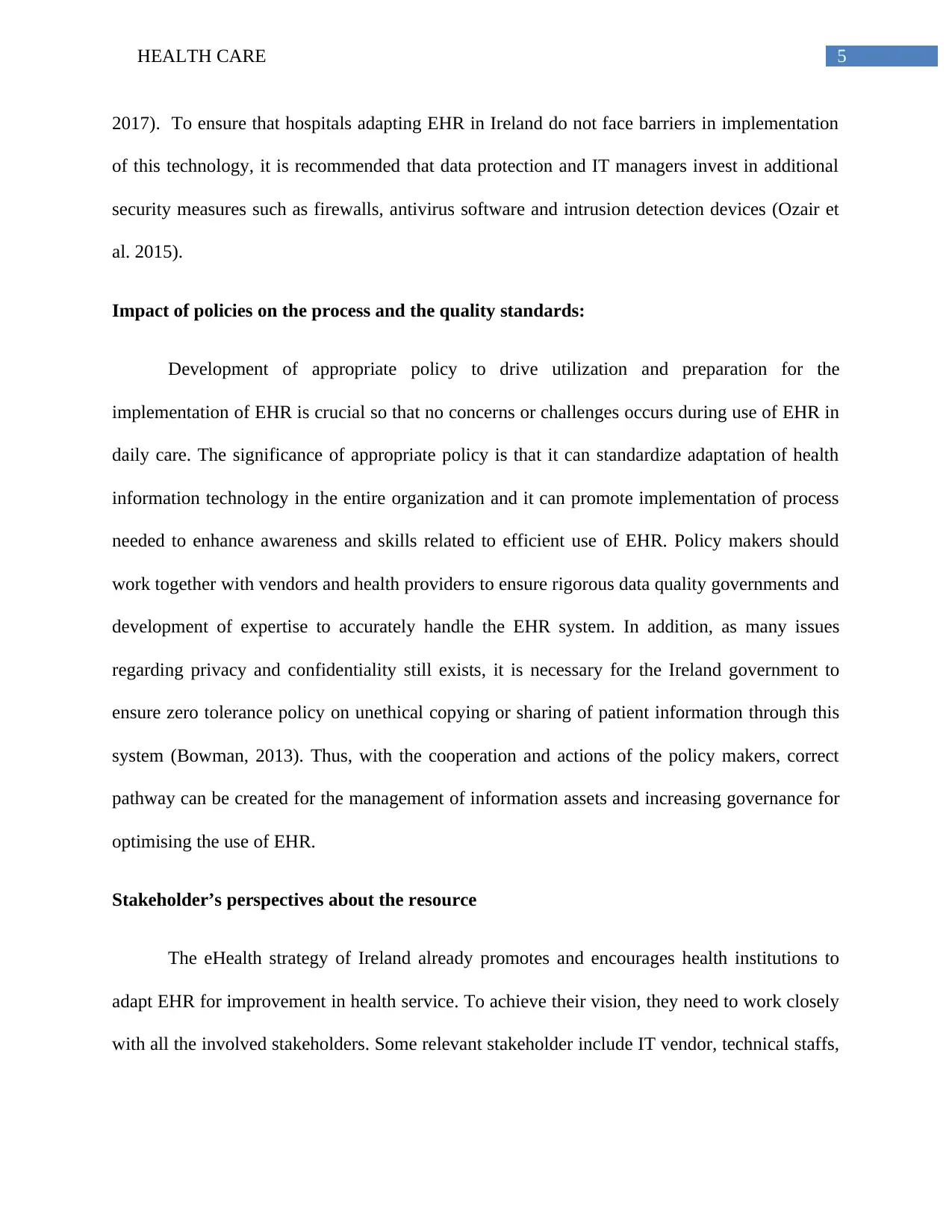
5HEALTH CARE
2017). To ensure that hospitals adapting EHR in Ireland do not face barriers in implementation
of this technology, it is recommended that data protection and IT managers invest in additional
security measures such as firewalls, antivirus software and intrusion detection devices (Ozair et
al. 2015).
Impact of policies on the process and the quality standards:
Development of appropriate policy to drive utilization and preparation for the
implementation of EHR is crucial so that no concerns or challenges occurs during use of EHR in
daily care. The significance of appropriate policy is that it can standardize adaptation of health
information technology in the entire organization and it can promote implementation of process
needed to enhance awareness and skills related to efficient use of EHR. Policy makers should
work together with vendors and health providers to ensure rigorous data quality governments and
development of expertise to accurately handle the EHR system. In addition, as many issues
regarding privacy and confidentiality still exists, it is necessary for the Ireland government to
ensure zero tolerance policy on unethical copying or sharing of patient information through this
system (Bowman, 2013). Thus, with the cooperation and actions of the policy makers, correct
pathway can be created for the management of information assets and increasing governance for
optimising the use of EHR.
Stakeholder’s perspectives about the resource
The eHealth strategy of Ireland already promotes and encourages health institutions to
adapt EHR for improvement in health service. To achieve their vision, they need to work closely
with all the involved stakeholders. Some relevant stakeholder include IT vendor, technical staffs,
2017). To ensure that hospitals adapting EHR in Ireland do not face barriers in implementation
of this technology, it is recommended that data protection and IT managers invest in additional
security measures such as firewalls, antivirus software and intrusion detection devices (Ozair et
al. 2015).
Impact of policies on the process and the quality standards:
Development of appropriate policy to drive utilization and preparation for the
implementation of EHR is crucial so that no concerns or challenges occurs during use of EHR in
daily care. The significance of appropriate policy is that it can standardize adaptation of health
information technology in the entire organization and it can promote implementation of process
needed to enhance awareness and skills related to efficient use of EHR. Policy makers should
work together with vendors and health providers to ensure rigorous data quality governments and
development of expertise to accurately handle the EHR system. In addition, as many issues
regarding privacy and confidentiality still exists, it is necessary for the Ireland government to
ensure zero tolerance policy on unethical copying or sharing of patient information through this
system (Bowman, 2013). Thus, with the cooperation and actions of the policy makers, correct
pathway can be created for the management of information assets and increasing governance for
optimising the use of EHR.
Stakeholder’s perspectives about the resource
The eHealth strategy of Ireland already promotes and encourages health institutions to
adapt EHR for improvement in health service. To achieve their vision, they need to work closely
with all the involved stakeholders. Some relevant stakeholder include IT vendor, technical staffs,
⊘ This is a preview!⊘
Do you want full access?
Subscribe today to unlock all pages.

Trusted by 1+ million students worldwide
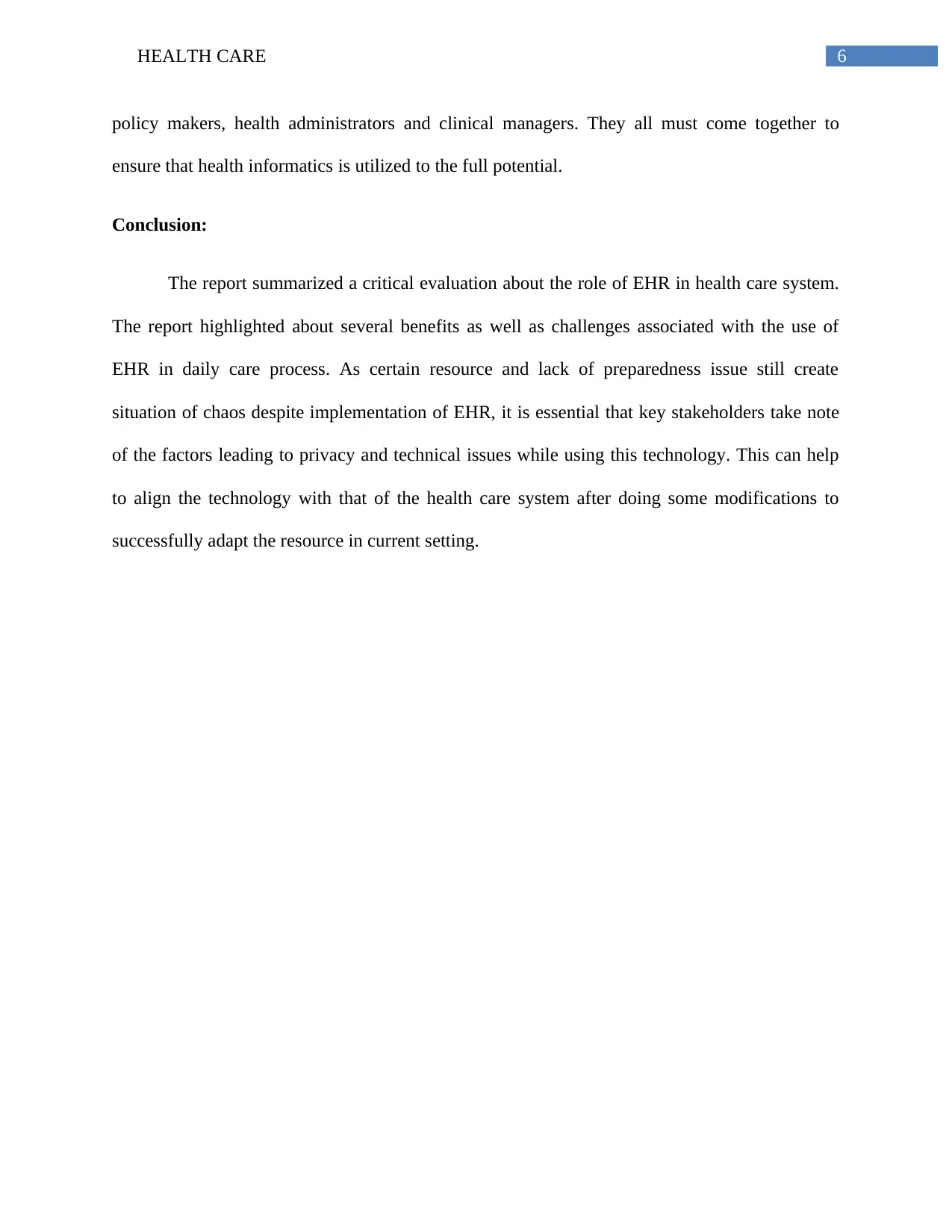
6HEALTH CARE
policy makers, health administrators and clinical managers. They all must come together to
ensure that health informatics is utilized to the full potential.
Conclusion:
The report summarized a critical evaluation about the role of EHR in health care system.
The report highlighted about several benefits as well as challenges associated with the use of
EHR in daily care process. As certain resource and lack of preparedness issue still create
situation of chaos despite implementation of EHR, it is essential that key stakeholders take note
of the factors leading to privacy and technical issues while using this technology. This can help
to align the technology with that of the health care system after doing some modifications to
successfully adapt the resource in current setting.
policy makers, health administrators and clinical managers. They all must come together to
ensure that health informatics is utilized to the full potential.
Conclusion:
The report summarized a critical evaluation about the role of EHR in health care system.
The report highlighted about several benefits as well as challenges associated with the use of
EHR in daily care process. As certain resource and lack of preparedness issue still create
situation of chaos despite implementation of EHR, it is essential that key stakeholders take note
of the factors leading to privacy and technical issues while using this technology. This can help
to align the technology with that of the health care system after doing some modifications to
successfully adapt the resource in current setting.
Paraphrase This Document
Need a fresh take? Get an instant paraphrase of this document with our AI Paraphraser
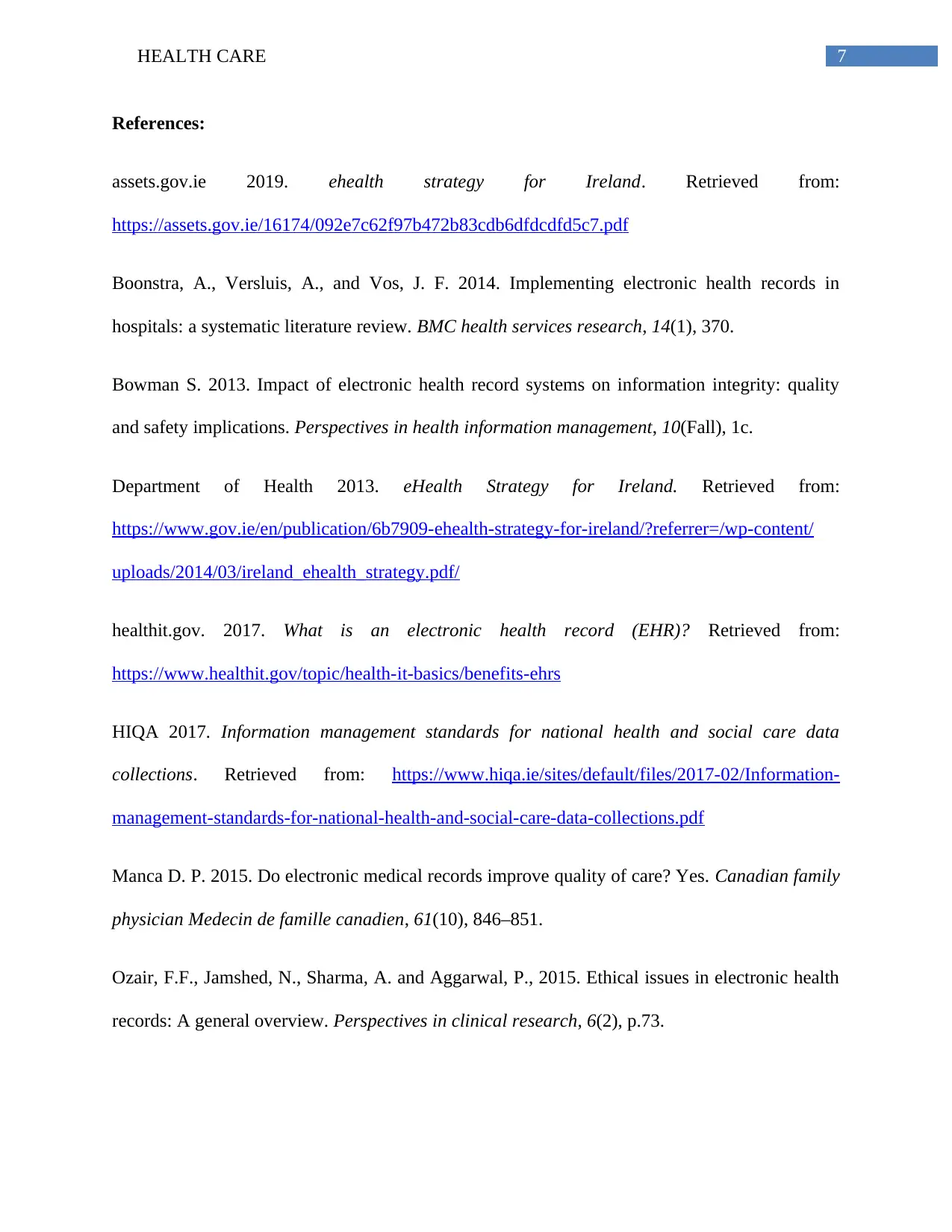
7HEALTH CARE
References:
assets.gov.ie 2019. ehealth strategy for Ireland. Retrieved from:
https://assets.gov.ie/16174/092e7c62f97b472b83cdb6dfdcdfd5c7.pdf
Boonstra, A., Versluis, A., and Vos, J. F. 2014. Implementing electronic health records in
hospitals: a systematic literature review. BMC health services research, 14(1), 370.
Bowman S. 2013. Impact of electronic health record systems on information integrity: quality
and safety implications. Perspectives in health information management, 10(Fall), 1c.
Department of Health 2013. eHealth Strategy for Ireland. Retrieved from:
https://www.gov.ie/en/publication/6b7909-ehealth-strategy-for-ireland/?referrer=/wp-content/
uploads/2014/03/ireland_ehealth_strategy.pdf/
healthit.gov. 2017. What is an electronic health record (EHR)? Retrieved from:
https://www.healthit.gov/topic/health-it-basics/benefits-ehrs
HIQA 2017. Information management standards for national health and social care data
collections. Retrieved from: https://www.hiqa.ie/sites/default/files/2017-02/Information-
management-standards-for-national-health-and-social-care-data-collections.pdf
Manca D. P. 2015. Do electronic medical records improve quality of care? Yes. Canadian family
physician Medecin de famille canadien, 61(10), 846–851.
Ozair, F.F., Jamshed, N., Sharma, A. and Aggarwal, P., 2015. Ethical issues in electronic health
records: A general overview. Perspectives in clinical research, 6(2), p.73.
References:
assets.gov.ie 2019. ehealth strategy for Ireland. Retrieved from:
https://assets.gov.ie/16174/092e7c62f97b472b83cdb6dfdcdfd5c7.pdf
Boonstra, A., Versluis, A., and Vos, J. F. 2014. Implementing electronic health records in
hospitals: a systematic literature review. BMC health services research, 14(1), 370.
Bowman S. 2013. Impact of electronic health record systems on information integrity: quality
and safety implications. Perspectives in health information management, 10(Fall), 1c.
Department of Health 2013. eHealth Strategy for Ireland. Retrieved from:
https://www.gov.ie/en/publication/6b7909-ehealth-strategy-for-ireland/?referrer=/wp-content/
uploads/2014/03/ireland_ehealth_strategy.pdf/
healthit.gov. 2017. What is an electronic health record (EHR)? Retrieved from:
https://www.healthit.gov/topic/health-it-basics/benefits-ehrs
HIQA 2017. Information management standards for national health and social care data
collections. Retrieved from: https://www.hiqa.ie/sites/default/files/2017-02/Information-
management-standards-for-national-health-and-social-care-data-collections.pdf
Manca D. P. 2015. Do electronic medical records improve quality of care? Yes. Canadian family
physician Medecin de famille canadien, 61(10), 846–851.
Ozair, F.F., Jamshed, N., Sharma, A. and Aggarwal, P., 2015. Ethical issues in electronic health
records: A general overview. Perspectives in clinical research, 6(2), p.73.
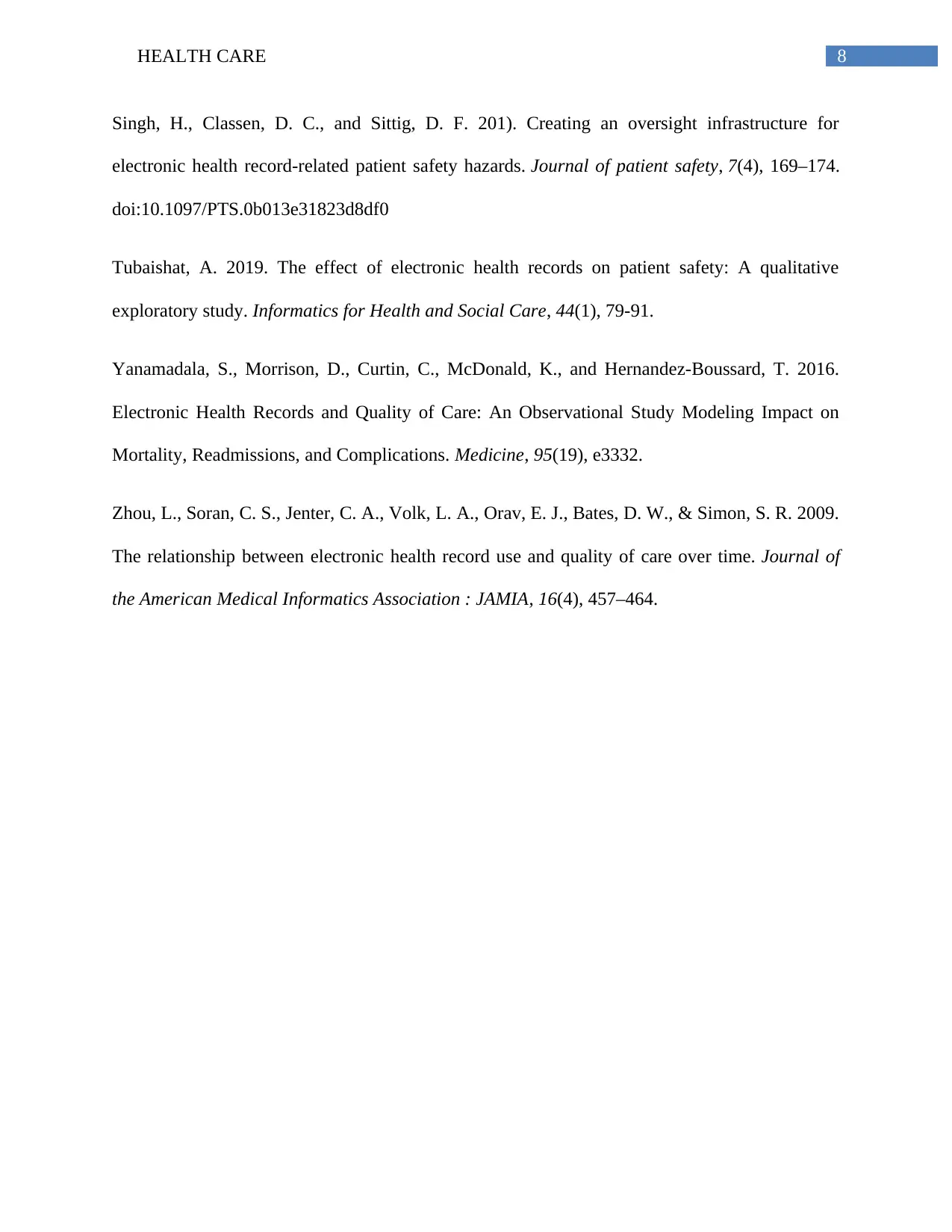
8HEALTH CARE
Singh, H., Classen, D. C., and Sittig, D. F. 201). Creating an oversight infrastructure for
electronic health record-related patient safety hazards. Journal of patient safety, 7(4), 169–174.
doi:10.1097/PTS.0b013e31823d8df0
Tubaishat, A. 2019. The effect of electronic health records on patient safety: A qualitative
exploratory study. Informatics for Health and Social Care, 44(1), 79-91.
Yanamadala, S., Morrison, D., Curtin, C., McDonald, K., and Hernandez-Boussard, T. 2016.
Electronic Health Records and Quality of Care: An Observational Study Modeling Impact on
Mortality, Readmissions, and Complications. Medicine, 95(19), e3332.
Zhou, L., Soran, C. S., Jenter, C. A., Volk, L. A., Orav, E. J., Bates, D. W., & Simon, S. R. 2009.
The relationship between electronic health record use and quality of care over time. Journal of
the American Medical Informatics Association : JAMIA, 16(4), 457–464.
Singh, H., Classen, D. C., and Sittig, D. F. 201). Creating an oversight infrastructure for
electronic health record-related patient safety hazards. Journal of patient safety, 7(4), 169–174.
doi:10.1097/PTS.0b013e31823d8df0
Tubaishat, A. 2019. The effect of electronic health records on patient safety: A qualitative
exploratory study. Informatics for Health and Social Care, 44(1), 79-91.
Yanamadala, S., Morrison, D., Curtin, C., McDonald, K., and Hernandez-Boussard, T. 2016.
Electronic Health Records and Quality of Care: An Observational Study Modeling Impact on
Mortality, Readmissions, and Complications. Medicine, 95(19), e3332.
Zhou, L., Soran, C. S., Jenter, C. A., Volk, L. A., Orav, E. J., Bates, D. W., & Simon, S. R. 2009.
The relationship between electronic health record use and quality of care over time. Journal of
the American Medical Informatics Association : JAMIA, 16(4), 457–464.
⊘ This is a preview!⊘
Do you want full access?
Subscribe today to unlock all pages.

Trusted by 1+ million students worldwide
1 out of 9
Related Documents
Your All-in-One AI-Powered Toolkit for Academic Success.
+13062052269
info@desklib.com
Available 24*7 on WhatsApp / Email
![[object Object]](/_next/static/media/star-bottom.7253800d.svg)
Unlock your academic potential
Copyright © 2020–2026 A2Z Services. All Rights Reserved. Developed and managed by ZUCOL.





